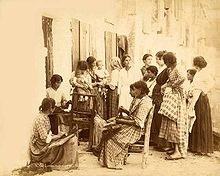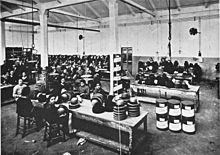Feminism in Italy
[4] Italian feminism has become more prominent recently, particularly during the administration of former Prime Minister Silvio Berlusconi, with a focus on opposing objectification of women in national television shows and politics.
Humanism pushed aside the Medieval Christian concept of a hierarchical social order that placed regular citizens in a subservient position relative to members of the clergy.
Christine de Pizan wrote The City of Ladies in 1404, and in it she describes women's gender as having no innate inferiority to men's: "[N]either the loftiness nor the lowliness of a person lies in the body according to sex, but in the perfection of conduct and virtues".
From the Renaissance and continuing into the Early Modern era, they hosted salons, where men and women of intellect mingled and discussed literature, politics, and other influential topics.
By the late 16th and early 17th century, women writers "presented themselves and were embraced by contemporary culture as learned wives, mothers, and equal partners in their household salons".
[8] By the late Renaissance, educated Italian women were writing "in every conceivable genre, from domestic correspondence to poetry, dialogues and even theology".
Women were to become the backbone of Italy's education system, and they belonged to teachers' associations, giving them experience in organizing to protect their interests, such as wages and working conditions.
[10] Anna Maria Mozzoni triggered a widespread women's movement in Italy through the publication of Woman and her social relationships on the occasion of the revision of the Italian Civil Code (La donna e i suoi rapporti sociali in occasione della revisione del codice italiano) in 1864.
The journal covered international feminist news, such as the political and social gains being made by women in France, the United States, and Great Britain.
[11] Italy's first national Feminist Congress was organized by Per la Donna in 1911; in it speakers called for divorce rights for women, and more non-religious schools.
The trial (which happened in 1966[16]) had a wide resonance in Italy, as Viola's behavior clashed with traditional social conventions in Sicily, whereby a woman would lose her honour if she did not marry the man to whom she had lost her virginity.
To celebrate, one of the founding members, Mariarosa Dalla Costa, gave a speech entitled "A General Strike" in Mestre, Italy.
In Padua, Italy, a group called Lotta Feminista, formed by Mariarosa Dalla Costa and Silvia Federici, adopted Wages for Housework as their organizing strategy.
[21][22] The Campaign was formed to raise awareness of how housework and childcare are the base of all industrial work and to stake the claim that these unavoidable tasks should be compensated as paid wage labor.
The same sentence shall apply to whom, in the above circumstances, causes the death of the person involved in illegitimate carnal relations with his spouse, daughter, or sister.
Neither the law nor society made a distinction between such premarital rape on the one hand, and consensual elopement (in Sicily commonly called fuitina) on the other.
The court stated in its decision "it is a fact of common experience that it is nearly impossible to slip off tight jeans even partly without the active collaboration of the person who is wearing them.
Soon Patricia Giggans, executive director of the Los Angeles Commission on Assaults Against Women, (now Peace Over Violence) made Denim Day an annual event.
[38] In 1996, Italy amended its rape laws, toughening the punishment for sexual assault and reclassifying it from a moral offense to a criminal felony.
Penalty can be reduced up to 2⁄3 if the harm caused is of modest entity (i.e. if partially or completely unsuccessful), but may also be elevated up to 1⁄3 if the victim is a minor or if the offense has been committed for profit.


